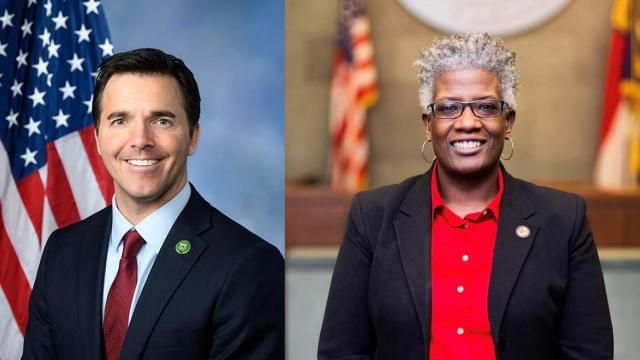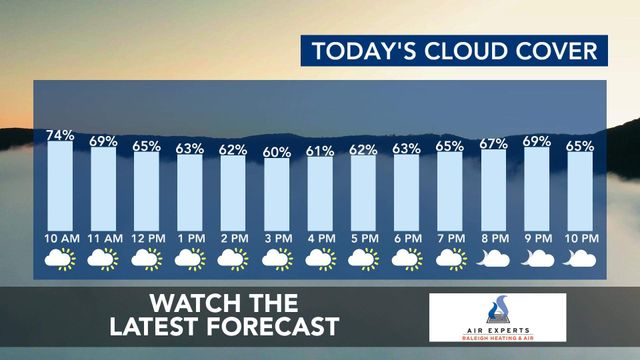Secretive conservative groups spending big to influence NC Democratic primaries

As North Carolina’s 2024 primary elections heat up, it appears that at least hundreds of thousands of dollars have begun pouring in to influence some key races on the Democratic side from an unlikely source: Secretive outside groups tied to top Republican leaders.
The Democratic primary for attorney general pits U.S. Rep. Jeff Jackson against Durham District Attorney Satana Deberry and Tim Dunn, a lawyer from Fayetteville.
On Friday Jackson accused an outside group — which has been heavily promoting Deberry as the more progressive candidate in the race — of being a fake liberal group that’s actually backed by GOP interests, based on a report by Charlotte public radio station WFAE.
“It is now on track to spend $1 million just to beat me in the primary,” Jackson said in a social media video Friday. “But here's the kicker: It's funded by the other party. So I'm now running in a primary where the top spender isn't me or my opponent, it's the other party.”
Jackson, Deberry and Dunn are running to replace Democrat Josh Stein, who’s running for governor to replace term-limited Gov. Roy Cooper, a fellow Democrat. The winner in the Democratic attorney general primary will face Republican U.S. Rep. Dan Bishop in the general election. Bishop is running unopposed.
Deberry criticized Jackson for attributing the mailers backing her candidacy to a secret GOP operation, noting that there's not currently any indication of who paid for the effort.
"As any candidate for attorney general should know, it's wildly irresponsible to make assumptions about the source of funding without proof," she said.
There’s no direct proof the group behind the pro-Deberry ads, the And Justice For All PAC, is backed by Republicans. In part that’s because almost nothing is publicly known about it. The group only formed this month and has yet to submit paperwork that could show who’s funding it, or other identifying information. The political action committee’s physical address leads to a mail center in Washington, D.C., and its phone number goes straight to voicemail. The group’s listed contact did not respond to a request for comment.
But there are some clues about who is behind it.
The small, niche bank in Virginia it uses was founded by a former Republican U.S. senator and media reports indicate it serves a clientele made up largely of Republican politicians and political groups. The PAC’s ad buyer is Political Communications Advertising, which public records show has worked almost exclusively for Republican clients in the past — mostly the National Republican Congressional Committee, a group run by U.S. Rep. Richard Hudson, a Republican from North Carolina and a colleague of both Bishop and Jackson in Congress.
While that PAC is seeking to bolster the more progressive candidate in the Democratic primary for attorney general, a separate dark money group with deep ties to GOP leadership at the state level is taking the opposite tactic.
In both cases, the group is supporting more moderate incumbents — state Reps. Michael Wray, D-Northampton, and Cecil Brockman, D-Guilford — against progressive challengers this March.
Carolina Leadership Coalition
Election day for the primary is now less than two weeks away. And while neither of the challengers to Wray and Brockman have much money in their own campaign accounts, outside liberal groups are expected to back the challengers in the waning days of the race.
Enter the Carolina Leadership Coalition, a conservative group that recently started sending out pro-Brockman mailers in his High Point district and pro-Wray mailers in his district covering Warren, Halifax and Northampton counties in the area north of Rocky Mount.
The CLC made headlines in the 2022 elections for mailers with a digitally altered image of Democratic Rep. Ricky Hurtado, D-Alamance, falsely making it look as if he wore a “Defund The Police” shirt. Hurtado ended up losing reelection with 49% of the vote.
But now in 2024 the group is sending out mailers with high praise for two other Democrats, Wray and Brockman.
Each of them “is making a BIG difference for our community,” both mailers say.
Brockman and Wray are among a small handful of Democrats who sided with Republicans on some key votes during the 2023 legislative session, which also saw Charlotte-area Rep. Tricia Cotham switch parties to give Republicans a veto-proof supermajority in the legislature. Democrats are hoping to break that supermajority in 2024. Some believe it’ll require not only flipping Cotham’s seat back — a top priority for a party out for political revenge — but also using the party primaries in March to unseat members who might be swayed to cross party lines again in the future.
It’s in that context that Wray and Brockman face challengers who are backed by activist groups including Carolina Forward, the Young Democrats of North Carolina and others on the party’s left wing.
“There’s a lot of people who’ve been watching Michael Wray and Cecil Brockman for a while, mostly because their voting records don’t match their district,” Carolina Forward leader Blair Reeves said.
Both lawmakers represent majority-minority districts. Brockman is Black; Wray is white. Brockman strongly contested Reeves’ criticism, saying in an interview that some progressive activists mistakenly assume all Black voters hold certain political views because of their race.
“Just because it’s a strongly minority district doesn’t mean it will necessarily vote the way you want it to vote,” Brockman said. “You do not own the Black vote.”
Veto history
In the 2023 session, Cooper vetoed 19 bills. Republicans successfully overrode all 19 — sometimes purely along party lines, but other times with a small number of Democrats voting against Cooper. Wray sided with Republicans on new laws limiting transgender rights; Brockman sided with the GOP on two new charter school laws.
And both broke party ranks to join Republicans in passing a handful of new pro-business changes to state law, including:
- Allowing consumer loan companies to charge higher fees and interest rates.
- Banning any new energy efficiency rules for residential construction.
- Rolling back environmental protections for wetlands.
It was possibly their votes on bills backed by the business community that won attention from the CLC, which advocates for “limited government, free enterprise and low taxation,” according to its website.

Wray said he has no control over outside groups like the CLC or any mailers they choose to send out — but he added that he has never shied away from his pro-business record.
“As to the mailers that have recently been sent on my behalf, those are independent expenditures that I am not allowed to coordinate or know anything about,” Wray said. “I have a strong record of supporting small businesses in my district and work very hard to bring needed resources back to my district. If outside groups want to highlight my record in this regard, I am delighted.”
Rodney Pierce, the middle school history teacher who’s challenging Wray in the Democratic primary, said he’s particularly incensed by Wray’s environmental record. The district includes Warren County, which is where the Environmental Justice movement began in the 1980s, before it spread nationwide with its goal of highlighting how pollution often disproportionately affects minority communities.
“I don’t understand how someone could represent the birthplace of the environmental justice movement and yet vote to override the governor’s veto on an anti-environmental bill,” Pierce said.
In addition to his vote this year to undo wetlands protections as part of the annual Farm Act, Wray also joined Republicans in 2017 to co-sponsor a new law essentially banning North Carolinians from suing farms over “nuisance” issues such as excessive odor, noise and pollution. The legislature acted to stop those lawsuits after hog producers lost a series of legal fights in which juries ordered them to pay Eastern North Carolina families living near their hog farms hundreds of millions of dollars for harming their property values.
One of the three current leaders of the CLC is Jeffrey Turner, executive vice president of Murphy Family Ventures — a management company run by the family behind Murphy-Brown, one of the defendants in the hog farm lawsuits. He didn’t respond to a request for comment on the mailers. Nor did Michael Luethy, a GOP operative who has worked with the CLC.
The mailers mostly focus on highlighting parts of the new state budget, which passed with no Democratic support in the state Senate, and only five of the 48 House Democrats: Reps. Carla Cunningham, Garland Pierce and Shelly Willingham, plus Brockman and Wray.
The budget finalized Medicaid expansion — a longtime goal of Cooper and other Democratic Party leaders — but Democrats opposed the budget for a number of other reasons, including hundreds of millions of dollars extra per year to the voucher program that gives taxpayer-funded aid for private school tuition.
Wray has cited Medicaid expansion as a reason why he voted for the budget; Pierce has used the voucher piece of it to criticize him.
Wray and Brockman also both made news last year for a vote they missed — to repeal the state’s pistol permit requirements. Their absence during that vote gave Republicans the numbers they needed to overturn Cooper’s veto.
Brockman’s opponent James Adams, the former president of the local NAACP chapter, is highlighting that.
“The James Adams campaign is aware of several mail pieces that have gone out from organizations with strong ties to Republicans in support of our opponent,” aide Justin Cundall said. “This demonstrates what we already knew. That Rep. Brockman is a key vote (or absence from the chamber) for them when the chips are down. Republicans want to see him stay in office enough to spend money to help make that a reality.”
Who is the CLC?
The Carolina Leadership Coalition’s original founders included two Republicans from the same small town as House Speaker Tim Moore, R-Cleveland. Its current leaders include several politically connected businessmen who Moore and other GOP leaders have appointed to high-profile government positions. Tax records show its fundraising is handled by a limited liability corporation registered to a Republican political operative from Charlotte.
The group used to disclose where it got its money and how it spent those funds. But since the 2020 elections it has been allowed to keep that information secret by claiming a certain type of tax status, as a mostly non-political “social welfare” group.
Tax law says in order for those groups to keep their donors secret they can’t primarily engage in political activities. But the law is vague and, in practice, given lax oversight.
Many groups organized as social welfare groups are well known for their political activities, including Planned Parenthood Action Fund and the National Rifle Association. In North Carolina’s 2014 election for the U.S. Senate, one social welfare group spent 97% of its money on ads promoting Republican candidate Thom Tillis, despite the legal requirement to remain primarily non-political. The Federal Elections Commission declined to take any action.
In the case of the mailers this year, a spokesman for the North Carolina State Board of Elections said it’s seen the CLC fliers and doesn’t believe they have legally crossed a line into political advocacy that would require the group to report more information to the state.
And while the elections board requires frequent filings by political groups — sometimes with updates due every few days — other nonprofits aren’t beholden to similar rules. The CLC’s most recent publicly available tax filings are from the 2021-22 fiscal year, when it raised just over $1.1 million.
It’s unclear who gave that money, what the money was spent on, or how much the group has raised for this year’s elections.















